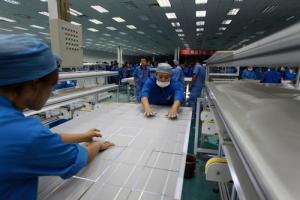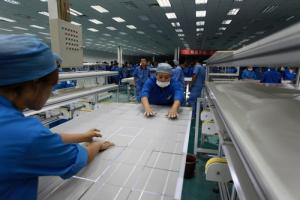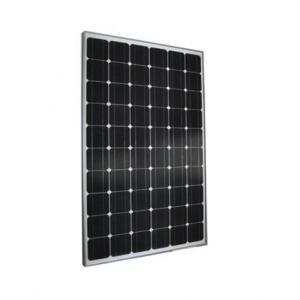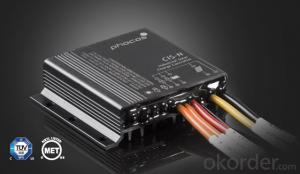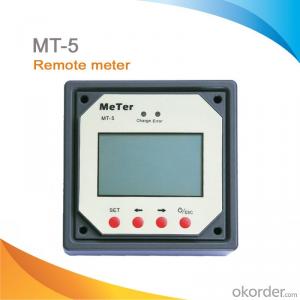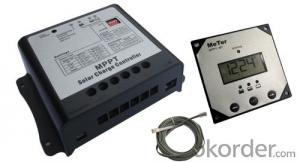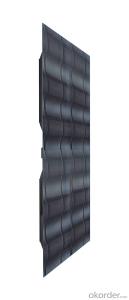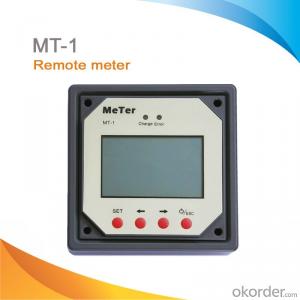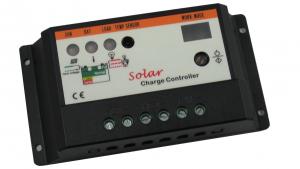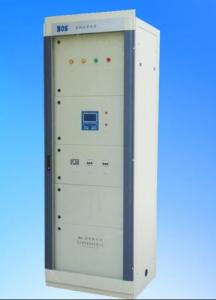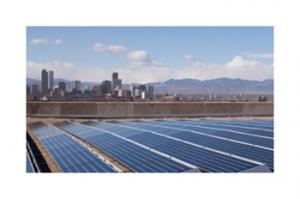Solar Charge Controllers Regulators 12/24/48V
- Loading Port:
- Shekou
- Payment Terms:
- TT or LC
- Min Order Qty:
- 50 pc
- Supply Capability:
- 100000 pc/month
OKorder Service Pledge
OKorder Financial Service
You Might Also Like
Solar Charge Controllers Regulators 12/24/48V
PC1600 is an advanced Maximum Power Point Tracking (MPPT) controller for off-grid photovoltaic (PV) systems .The controller features a smart tracking algorithm that maximizes the energy harvest from the PV by rapidly finding the solar array peak power point in all the weather condition. The controller provides higher efficiency up to 98% with lower power loss.
1. MPPT Solar Charger Controller Characteristics:
·45A/60A MPPT solar charge controller
·24V/48V auto work
·PV Output :70v-145v
·Several seconds tracking speed
·High Tracking efficiency of 99%
·Multiphase synchronous rectification technology
·Peak conversion efficiency of 98%
·DSP processors architecture ensures high speed and performance
·Multifunction LCD displays system data and status
·Four stages charging optimizes battery performance
Product Description
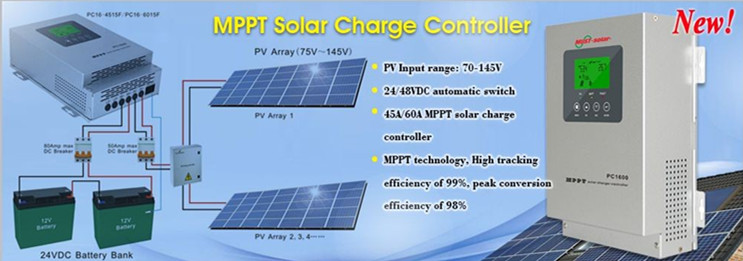
PC1600 is an advanced Maximum Power Point Tracking (MPPT) controller for off-grid photovoltaic (PV) systems .The controller features a smart tracking algorithm that maximizes the energy harvest from the PV by rapidly finding the solar array peak power point in all the weather condition. The controller provides higher efficiency up to 98% with lower power loss.
Features:
·45A/60A MPPT solar charge controller
·24V/48V auto work
·PV Output :70v-145v
·Several seconds tracking speed
·High Tracking efficiency of 99%
·Multiphase synchronous rectification technology
·Peak conversion efficiency of 98%
·DSP processors architecture ensures high speed and performance
·Multifunction LCD displays system data and status
·Four stages charging optimizes battery performance
Mppt solar charge controller details :
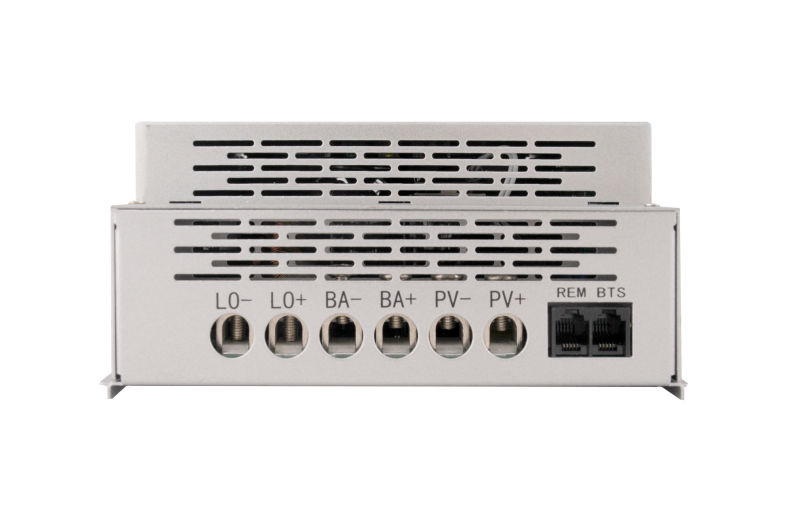
Mppt solar charge controller application :
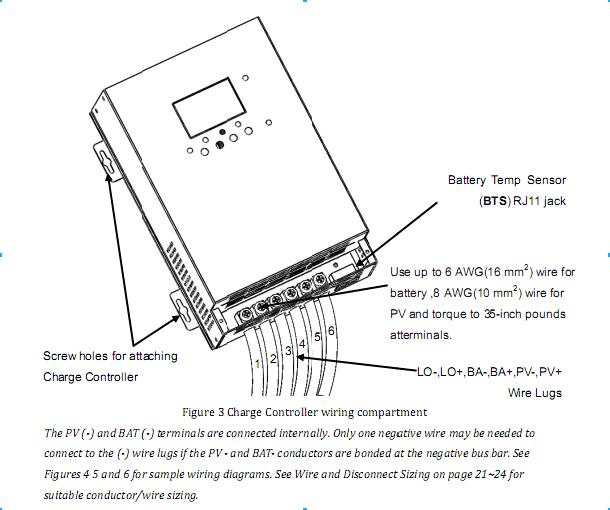
2. MPPT Electronic Controller specifications:
| Model | PC16-4515F | PC16-6015F |
| Default Battery system Voltage | 24v/48vdc(adjustable) | |
| Charge Input | ||
| PV Open Circuit Voltage range | Operational max=145VDC temperature correct VOC | |
| Max PV input power(24v) | 1200W | 1600W |
| Max PV input power(48v) | 2400W | 3200W |
| Battery voltage | ||
| Nominal Voltage | 24V / 48V | |
| Absorption Voltage | 27.0V / 54.0V | |
| Refloat Voltage | 27.4V / 54.8V | |
| Float Voltage | 28.6V / 57.2V | |
| Low voltage protection point | 21.0V / 42.0V | |
| DC Output | ||
| Output Voltage | 22.0-28.6V / 44V-57.2V | |
| Rated Current | 45A continuous @40°C ambient | 60A continuous @40°C ambient |
| Warning for low voltage | 23.0V / 46.0V | |
| Cut off for low voltage | 21.6V / 43.0V | |
| Low voltage recovery | 26.0V / 46.0V | |
| Display | ||
| LED indication | Systematic operation, LV indication, LV protection, over charge protection, loads protection, short circuit protection | |
| LCD display(optional) | Charge voltage, charge current, voltage of storage battery, capacity of storage battery, output current | |
| Alarm Protections | 1.PV array short circuit protection, PV reverse polarity protection 2.Battery reverse polarity protection , Over charging protection 3.Output short circuit protection 4.Low voltage protection for storage battery | |
| General specification | ||
| Protection Level | In compliance with regulations of DIN EN60529 and standards of IP22 | |
| Charge mode | PWM ,constant current—constant voltage, function of automatic protection for storage battery | |
| Radiating mode | Fan cooling | |
| Working mode | General controller | |
| Efficiency | ≥98% | |
| Self -consumption | < 10mA | < 15mA |
| Environment | ||
| Environmental temperature | -10°C --55°C | |
| Ambient humidity | 0--90%,No condensation | |
| Altitude | ≤4500m | |
| Dimension | ||
| Unit size D*W*H(mm)/G.W(kg) | 257.1*167.6*82.9mm/3kg | |
| Package size D*W*H(mm)/G.W(kg) | 390*365*365mm(6pcs/carton)/19kg | |
4. MPPT Solar Charger Controller FAQ:
We have organized several common questions for our clients, may help you sincerely:
1. How to choose a right solar controller?
Tell us your demand, then our sales will recommend a suitable one to you.
2. What is the solar inverter warranty?
Our product warranty is valid for 12 months after delivery. We undertake to repair any malfunctioned units due to defective components of inadequate workmanship ,but specially expecting any defects resulting from normal wear and tear of improper use of the products.
3. How long can we receive the product after purchase?
a.sample orders will be delivered from our factory within 7working days .
b.General orders(under 2000pcs) will be delivered from our factory within 25 working days.
c. Bulk orders (over 2000pcs )will be delivered from our factory within 35 working days at most
4. What is the payment term?
T/T (Telegraphic transfer) / Letter of credit
- Q:What is the maximum operating temperature of a solar controller?
- The maximum operating temperature of a solar controller typically depends on the specific make and model, but it is commonly around 40 to 60 degrees Celsius.
- Q:How does a solar controller prevent damage to the solar panels from overvoltage conditions?
- The flow of electricity from the solar panels to the battery or grid is regulated by a solar controller to prevent damage to the panels caused by overvoltage conditions. Acting as a bridge between the panels and the battery or grid, it guarantees that the voltage output from the panels remains within safe limits. When generating electricity, the solar panels produce a voltage that varies depending on the intensity of sunlight. However, this voltage can fluctuate due to factors like weather conditions and panel temperature. Exceeding the safe operating range can result in panel damage. Constantly monitoring the voltage output from the panels, the solar controller activates a mechanism to prevent excess voltage from reaching the panels if it detects that the voltage is too high. Depending on the type of solar controller, this mechanism can involve techniques such as pulse width modulation (PWM) or maximum power point tracking (MPPT). PWM controllers regulate the voltage by rapidly switching the connection between the panels and the battery on and off. This effectively reduces the average voltage reaching the panels, preventing overvoltage conditions. On the other hand, MPPT controllers optimize energy conversion by adjusting the electrical load to extract maximum power from the panels without exceeding the safe voltage threshold. In both cases, the solar controller ensures that the voltage output from the panels remains within the specified range, safeguarding them from potential damage. Advanced solar controllers may also incorporate features such as temperature compensation to account for temperature variations, further enhancing the protection of the panels. In conclusion, a solar controller safeguards the solar panels from damage caused by overvoltage conditions by regulating and controlling the voltage output from the panels. Techniques like PWM or MPPT are employed to keep the voltage within safe limits. This protection mechanism prolongs the lifespan and enhances the efficiency of the panels, maximizing their performance and return on investment.
- Q:What is the maximum number of user profiles supported by a solar controller?
- The maximum number of user profiles supported by a solar controller can vary depending on the specific model and brand. However, most solar controllers typically support multiple user profiles, ranging from 2 to 10 profiles or more.
- Q:Can a solar controller be used in a solar-powered electric skateboard charging system?
- Yes, a solar controller can be used in a solar-powered electric skateboard charging system. A solar controller helps regulate the voltage and current from a solar panel to ensure efficient charging and protect the batteries. By connecting a solar controller to the solar panel and the electric skateboard's battery, it can effectively manage the charging process and optimize the use of solar energy.
- Q:What is the maximum output voltage for a solar controller?
- The maximum output voltage for a solar controller typically depends on the specific model and specifications. However, in general, most solar controllers have a maximum output voltage of around 12 to 24 volts, which is suitable for charging batteries or powering low-voltage devices.
- Q:Can a solar controller be used with a solar panel cleaning system?
- Yes, a solar controller can be used with a solar panel cleaning system. A solar controller is responsible for regulating the power flow from the solar panels to the batteries or grid, ensuring optimal performance and protection. Using a solar controller in conjunction with a solar panel cleaning system can help monitor and control the power output, ensuring efficient cleaning operations without any potential damage to the panels.
- Q:Can a solar controller be used with solar panels of different flexibilities?
- Solar panels of different flexibilities can indeed be used with a solar controller. The primary role of a solar controller is to oversee the charging process of batteries linked to the solar panel system. It effectively controls the flow of electricity from the solar panels to the batteries, ensuring an optimal charge. The compatibility of the solar panels with the solar controller remains unaffected by their flexibility, be it rigid or flexible. As long as the solar panels are designed to generate electricity from sunlight, they can be effectively connected to a solar controller for battery charging.
- Q:Can a solar controller be used with solar-powered streetlights?
- Yes, a solar controller can be used with solar-powered streetlights. A solar controller regulates the charging and discharging of the solar battery, ensuring efficient power management. It helps to maintain the battery's health and prevent overcharging or discharging, thus extending the lifespan of the battery. Therefore, a solar controller is an essential component for the effective operation of solar-powered streetlights.
- Q:Is a solar controller necessary for grid-tied solar systems?
- No, a solar controller is not necessary for grid-tied solar systems. Grid-tied systems are connected to the utility grid and do not require batteries to store excess energy. Therefore, a solar controller, which regulates the charging and discharging of batteries, is not needed in this type of system.
- Q:What is the role of a solar controller in preventing battery under-voltage?
- The role of a solar controller in preventing battery under-voltage is crucial in maintaining the health and performance of the battery system in a solar power setup. A solar controller, also known as a charge controller, is responsible for regulating the flow of electrical charge from the solar panels to the batteries. It acts as a middleman between the solar panels and the batteries, ensuring the batteries receive the appropriate amount of charge without being overcharged or undercharged. One of the key functions of a solar controller is preventing battery under-voltage. Under-voltage occurs when the battery's voltage drops below its minimum recommended level, which can cause permanent damage to the battery and lead to a significant decrease in its lifespan. To prevent battery under-voltage, the solar controller monitors the voltage level of the battery constantly. When it detects that the battery voltage is reaching or dropping below the minimum threshold, the controller takes action to prevent further discharge and damage. This is typically done by cutting off the connection between the solar panels and the batteries, preventing any more charge from flowing into the batteries. Additionally, some advanced solar controllers may incorporate features like low voltage disconnect (LVD) or battery protection algorithms. These features automatically disconnect the load from the battery when the voltage drops to a critical level, protecting the battery from further discharge and potential damage. By effectively preventing battery under-voltage, a solar controller ensures that the battery remains in a healthy state, maximizing its lifespan and overall performance. This is particularly important in off-grid or remote solar power systems where the batteries serve as a primary source of energy storage.
1. Manufacturer Overview |
|
|---|---|
| Location | |
| Year Established | |
| Annual Output Value | |
| Main Markets | |
| Company Certifications | |
2. Manufacturer Certificates |
|
|---|---|
| a) Certification Name | |
| Range | |
| Reference | |
| Validity Period | |
3. Manufacturer Capability |
|
|---|---|
| a)Trade Capacity | |
| Nearest Port | |
| Export Percentage | |
| No.of Employees in Trade Department | |
| Language Spoken: | |
| b)Factory Information | |
| Factory Size: | |
| No. of Production Lines | |
| Contract Manufacturing | |
| Product Price Range | |
Send your message to us
Solar Charge Controllers Regulators 12/24/48V
- Loading Port:
- Shekou
- Payment Terms:
- TT or LC
- Min Order Qty:
- 50 pc
- Supply Capability:
- 100000 pc/month
OKorder Service Pledge
OKorder Financial Service
Similar products
New products
Hot products
Hot Searches
Related keywords
